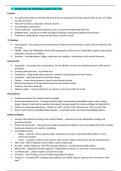1) BRITAIN AND THE AMERICAN COLONIES 1760-1763
Context:
VA (1607), MA (1620), by 1650 CT, NH, RI and MA, NY captured from Dutch (1664), 1660s NJ, NC, SC, 1680s
PA, DW, GA (1732)
More self-rule than in Spanish or French colonies
No assimilation with Natives
Great awakening – questioning authority, focus on personal relationship with God
Enlightenment – growth of scientific and logical, thinking, questioning tradition and authority
Proprietary (ruling family), corporate (business) or charter (royal)
13 Colonies:
New England – two corporate (more democracy), fishermen and merchants, export trade from Boston and
NY ports
Middle – major city Philadelphia, PN and DW proprietary, mostly farmers, wheat flour exports, large quaker
population, minority of Catholics
Southern – farming tobacco, indigo, cotton and rice, Anglican, rich planters, strict societal hierarchy
Government:
Geography – surrounded by rival territories, far from Britain, tension over disputed territory, still need for
protection
Growing ethnic diversity – less British feel
Proprietary – ruling family elects governor, voting for elected upper and lower houses
Corporate – votes elect governor and both houses
Charter – crown choses governor, lower house elected by votes
Britain’s Department of Trade and Secretary for the Southern States
Treasury, war office, admiralty
Salutary neglect – leaving colonies to own devices, only intervention for trade
Mercantilism:
Growing economies for mother country’s benefit
Trade and Navigation Acts – all cargos in British ships, enumerated commodities (sugar, cotton, indigo,
ginger, tobacco) could only be exported to England, European goods for colonies shipped to England first
Checks on colonial manufacturing – Wollen Act 1699, Hat Act 1732, Molasses Act 1733, iron Act 1750
Wasn’t well enforced, probably helped colonies – protected market, increased shipbuilding industry
Politics of Empire:
George III first Hanoverian King to be raised in Britain – wanted to be more influential in politics and
government policy
Britain not democratic – only small percentage of population eligible to vote, few independent MPs, wealthy
landowners decided who could be candidates
Two political parties
- Whigs – stood for reform, popular rights, opposed royal power, associated with wealthy m/c and
aristocratic families
- Tories – resistance, mainly country gentry, did not want religious tolerance or foreign entanglements
After 1720 – Robert Walpole, Henry Pelham, Duke of Newcastle
By 1760 – neither Whigs nor Tories had stronger influence – factionalised instable politics
William Pitt – supported colonial expansion, responsible for victory in 7 years war, removed by King
Lord Newcastle – salutary neglect, focused on Europe
Lord Bute – tutor to King, accused of influencing authoritarianism
George III – crowned 1760, complete legal authority over British citizens, paternal view of colonies, went
mad




